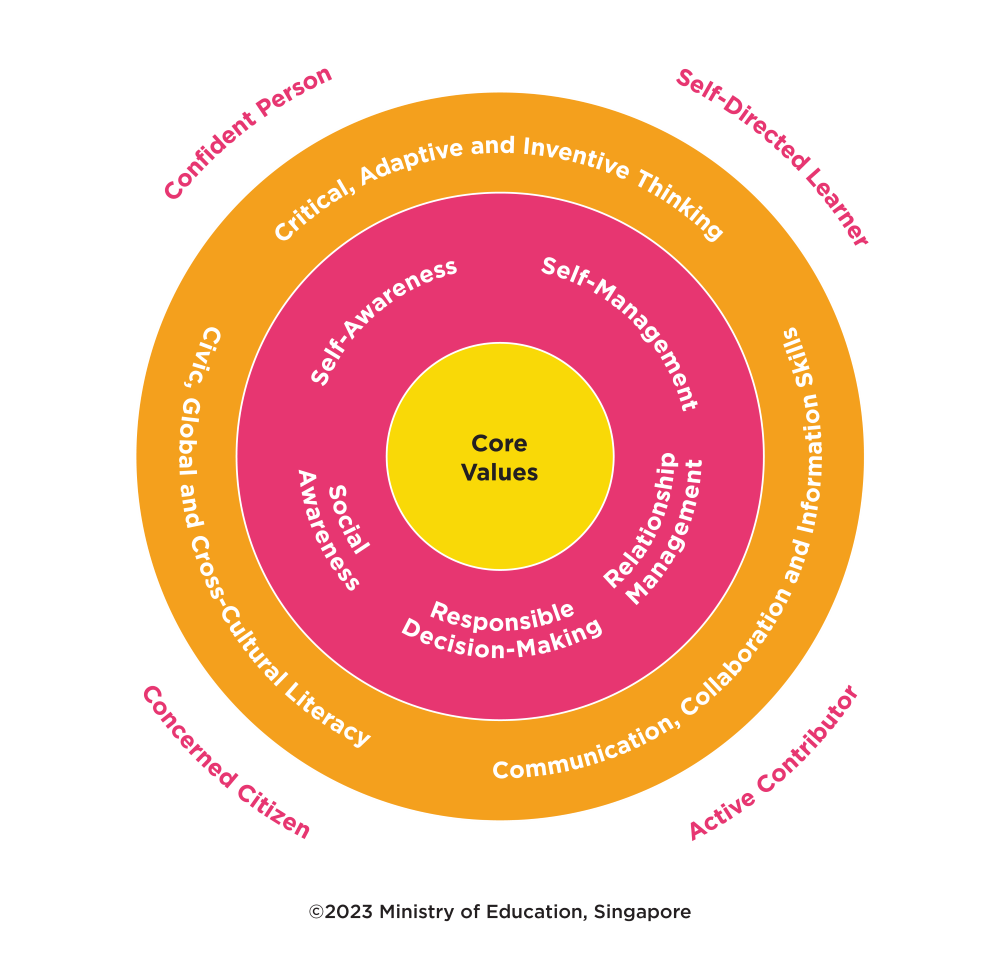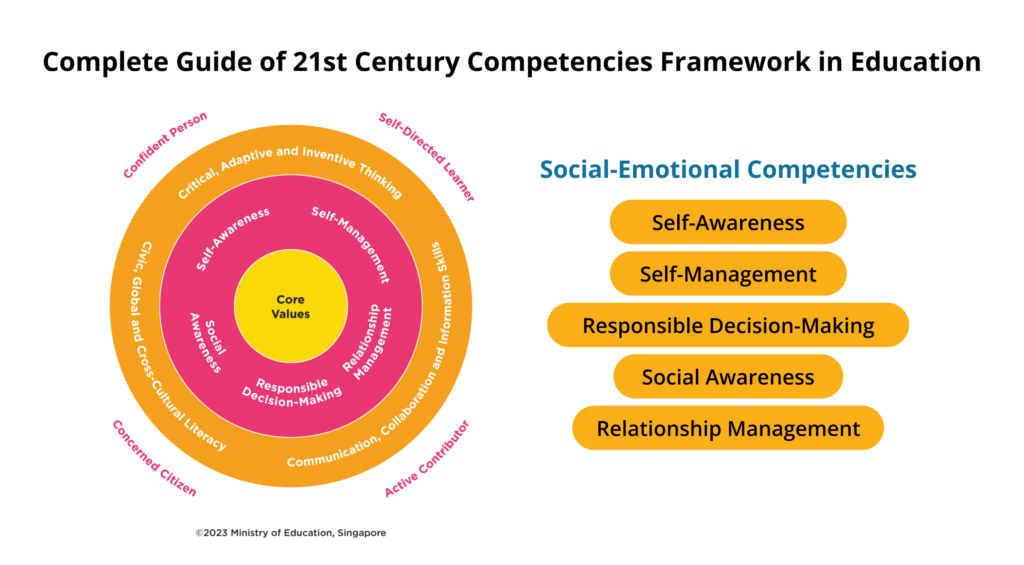The idea of “21st-century skills” may sound modern, but the concepts behind skills like critical thinking, teamwork, and problem-solving have long been fundamental in education. Schools are now recognising the urgent need to prioritise these skills. They are now integrating them into their plans to ensure students are well-prepared for their future education, careers, and everyday life. What exactly are these skills, and why are they so crucial? Let’s dive into how you can empower your students for success in the 21st century.
Building Character
Education is not just about academic excellence; it’s also about shaping students into thoughtful and caring people. At the heart of this development are values like treating others well, taking responsibility for actions, bouncing back from challenges, being honest, showing kindness, and promoting peace. These values are essential because they help students grow into respectful and compassionate members of their communities.

1. Respect
Respect is a fundamental value in education. Students show respect when they believe in their own self-worth and the intrinsic worth of others. This respect is crucial for building a positive learning environment and fostering mutual understanding.
2. Responsibility
Responsibility means recognising duties to oneself, family, community, nation, and the world. Students demonstrate responsibility by fulfilling their roles with love and commitment. This value helps students become dependable and accountable individuals.
Read More: Setting and Achieving Personal Learning Goals for Student Success
3. Resilience
Resilience is the ability to persevere in the face of challenges. Students show resilience by demonstrating emotional strength, courage, optimism, adaptability, and resourcefulness. This quality is essential for overcoming obstacles and achieving long-term success.
4. Integrity
Integrity involves upholding ethical principles and having the moral courage to stand up for what is right. Students with integrity are honest and principled, which helps build a trustworthy and fair community.
5. Care
Care is about acting with kindness and compassion. Students show care by contributing to improving their community and the world. This value fosters empathy and social responsibility.
6. Harmony
Harmony involves promoting social cohesion and appreciating the unity and diversity of a multicultural society. Students who uphold harmony help create a peaceful and inclusive environment.
Emotional Intelligence
Social-emotional competencies are essential for personal and interpersonal development. These skills, like knowing your own feelings, handling them well, making good choices, understanding others’ feelings, and getting along with people, are vital to growing personally and getting along well with others.
- Self-Awareness: Recognising one’s emotions and values.
- Self-Management: Regulating emotions and behaviours.
- Responsible Decision-Making: Making ethical and constructive choices.
- Social Awareness: Understanding others’ perspectives.
- Relationship Management: Building healthy and rewarding relationships.
Developing Skills for the Modern World
Preparing students for success in today’s dynamic world involves mastering various essential skills. These competencies not only enhance academic learning but also prepare students for future challenges in their careers and personal lives.
1. Critical, Adaptive, and Inventive Thinking
These abilities enable students to delve deeply into problems, adapt swiftly to changes, and devise innovative solutions.
- Critical Thinking: For example, a student critically analyses different sources of information for a research project, evaluating their credibility and relevance before concluding.
- Adaptive Thinking: An example is a student who quickly adjusts their study strategies when faced with a new and challenging subject.
- Inventive Thinking: This can be seen when a student comes up with a creative solution to a common problem, such as designing an eco-friendly project for a science fair.
2. Communication, Collaboration, and Information Skills
Effective communication skills help students express their ideas clearly and persuasively, which is essential for debates and presentations.
- Communication Skills: For instance, students present a clear and persuasive argument during a debate, effectively conveying their ideas to the audience.
- Collaboration Skills: An example is a group of students working together on a group project, dividing tasks based on each member’s strengths and coordinating their efforts to complete the project successfully.
- Information Skills: Students demonstrate this skill by efficiently researching a topic online, discerning reliable sources from unreliable ones, and synthesising the gathered information into a coherent presentation.
3. Civic, Global, and Cross-Cultural Literacy
In an interconnected world, understanding civic responsibilities, global issues, and diverse cultures is critical.
- Civic Literacy: For example, a student participates in a community service project, understanding the importance of civic engagement and contributing to societal well-being.
- Global Literacy: An example is a student who stays informed about international events and understands their global impact, demonstrating an awareness of global interconnectivity.
- Cross-Cultural Literacy: This can be seen when a student interacts respectfully with peers from diverse cultural backgrounds, shows an appreciation for cultural differences, and fosters inclusive relationships.
Read More: I Can Read & Oodles Learning Quest: Closing The Gaps with Smart Adaptive Assessment
Best Practices for Implementing 21st Century Competencies
Having a strong vision for 21st-century learning is just the first step. Without an intentionally designed plan for implementation, it’s unlikely that your students will acquire the skills outlined in your district’s vision. Here are some best practices from Panorama’s partner districts to set you up for success.
1. Build Staff Capacity to Demonstrate 21st Century Skills
It all starts with the adults in your building. Teachers and staff need to deeply understand and model the skills that you want your students to develop. Integrate 21st-century skills into staff professional development as a precursor to growing these competencies in students.
2. Develop Strategies to Support Teachers with Implementation
It can be helpful to create a playbook of recommended strategies and approaches that span across content areas. For instance, you might encourage teachers to add comments to report cards about students’ 21st-century skills.
3. Assess Students’ 21st Century Learning Skills

What gets measured matters. Utilising tools like HeyHi can simplify assessing students’ development in 21st-century skills. HeyHi revolutionises the classroom with a robust AI-powered e-assessment and personalised adaptive learning system.
- AI-Powered Assessment: HeyHi allows educators to create adaptive worksheets and lesson modules tailored to students’ needs. Teachers can automate grading and receive detailed insights into each student’s performance across various 21st-century competencies.
- Adaptive Learning System: HeyHi provides 24/7 adaptive feedback through its AI Learning Buddy, accelerating students’ learning by identifying and addressing their 21st-century skills gaps in real-time.
- Tracking Performance: Through HeyHi, educators can track students’ learning progress. HeyHi can also efficiently assess students’ 21st-century competencies, providing insights that guide personalised learning pathways and support holistic education.
Visit HeyHi’s website to learn more and start transforming your students’ educational experience today. Try HeyHi now! Click here!
4. Proactively Identify and Support Students
Once you have data on students’ 21st-century skills using platforms like HeyHi, you’ll want to ensure that it translates into actionable insights. Many schools implement an early warning system with indicators covering academics, attendance, behaviour, and social-emotional learning or 21st-century skills. This system helps educators make data-driven decisions to support each student effectively.
Read More: What, When, and How to Assess Student Learning
Conclusion
Preparing students for the future requires a comprehensive approach to education. By focusing on core values, social-emotional competencies, and emerging 21st-century skills, we can equip students with the tools they need to succeed. Integrating these competencies into the curriculum and implementing best practices will help students become responsible, adaptive, and innovative individuals ready to face future challenges.

HeyHi empowers schools and education institutions to enable personalised adaptive learning with a robust AI-powered e-assessment and learning system. We allow schools to offer holistic education, encompassing both foundational academic learning and 21st Century Competencies development. With in-depth assessment, schools can profile learners using diverse data sources, surpassing conventional limits.
Website: heyhi.sg
LinkedIn: linkedin.com/company/heyhilearningspace/
Facebook: facebook.com/HeyHiLearningSpace
Instagram: instagram.com/heyhilearningspace/
